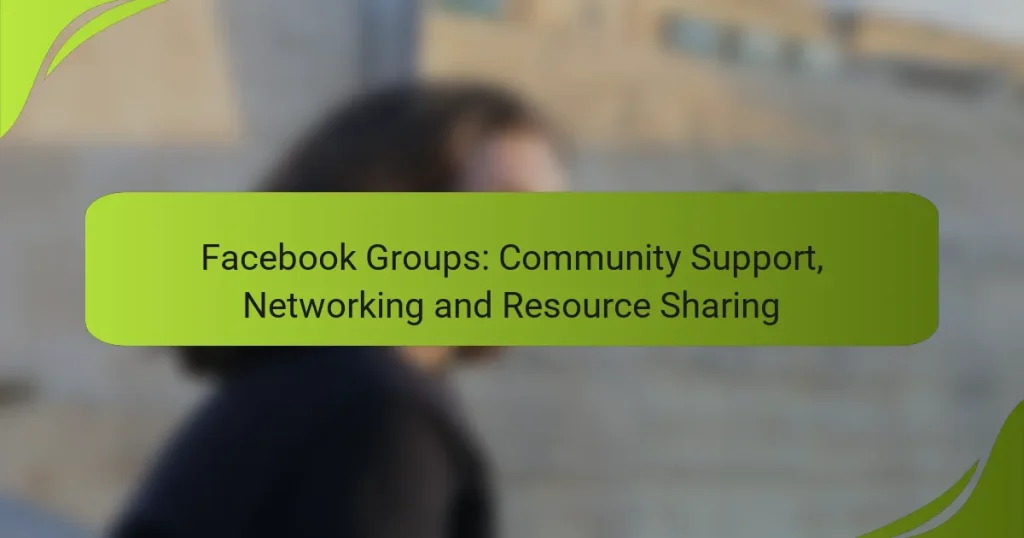Facebook Groups serve as vibrant platforms for community support, networking, and resource sharing, allowing members to connect over shared interests and goals. These groups not only foster a sense of belonging but also provide valuable opportunities for personal and professional growth through collaboration and knowledge exchange. By actively participating and sharing relevant content, users can enhance the group’s value and accessibility for all members.
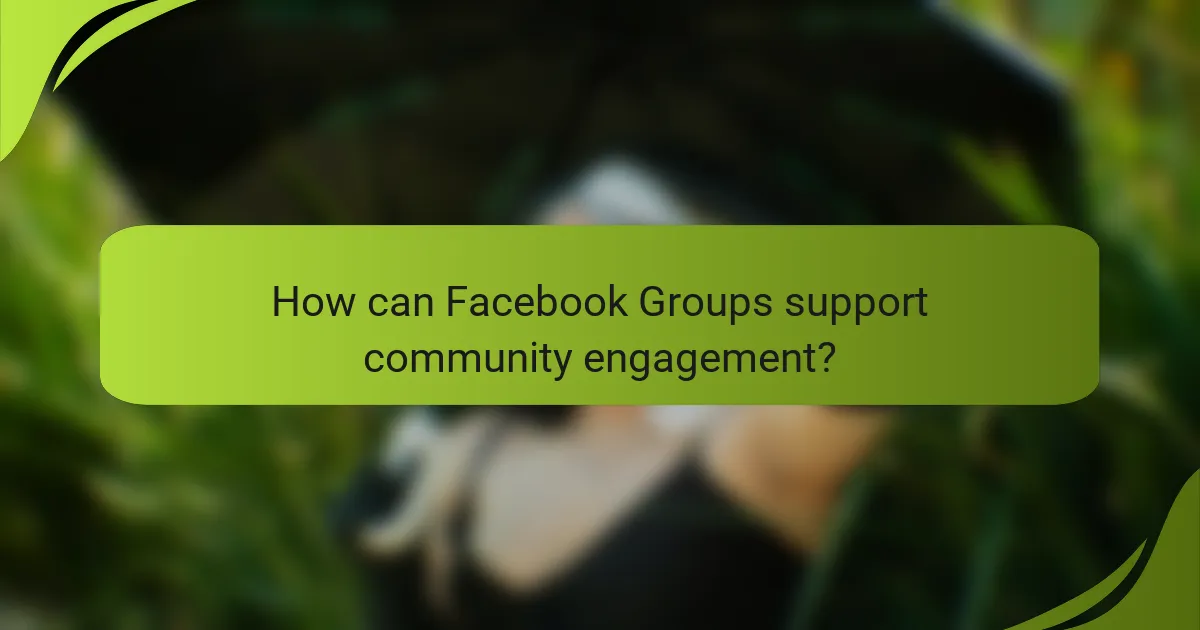
How can Facebook Groups support community engagement?
Facebook Groups enhance community engagement by providing a platform for members to connect, share resources, and participate in discussions. These groups foster a sense of belonging and encourage active participation among users with shared interests or goals.
Facilitating discussions
Facebook Groups create an environment where members can engage in meaningful conversations. By posting questions or topics, users can spark discussions that allow for diverse perspectives and insights. This interaction not only helps in knowledge sharing but also strengthens community ties.
To facilitate effective discussions, group admins can set clear guidelines and encourage respectful dialogue. Regular prompts or themed discussion days can also keep conversations lively and relevant.
Building relationships
Through consistent interaction in Facebook Groups, members can build strong relationships with one another. Sharing personal experiences, offering support, and celebrating achievements fosters a sense of camaraderie among group members.
To enhance relationship-building, consider organizing virtual meetups or collaborative projects. These activities can deepen connections and create a supportive network that extends beyond the online platform.
Encouraging collaboration
Facebook Groups serve as a hub for collaboration, allowing members to work together on projects or initiatives. By pooling resources and skills, group members can achieve common goals more effectively than they could individually.
To encourage collaboration, group admins can create specific threads for project ideas or resource sharing. Establishing clear roles and responsibilities can also help streamline efforts and ensure everyone contributes to the group’s success.
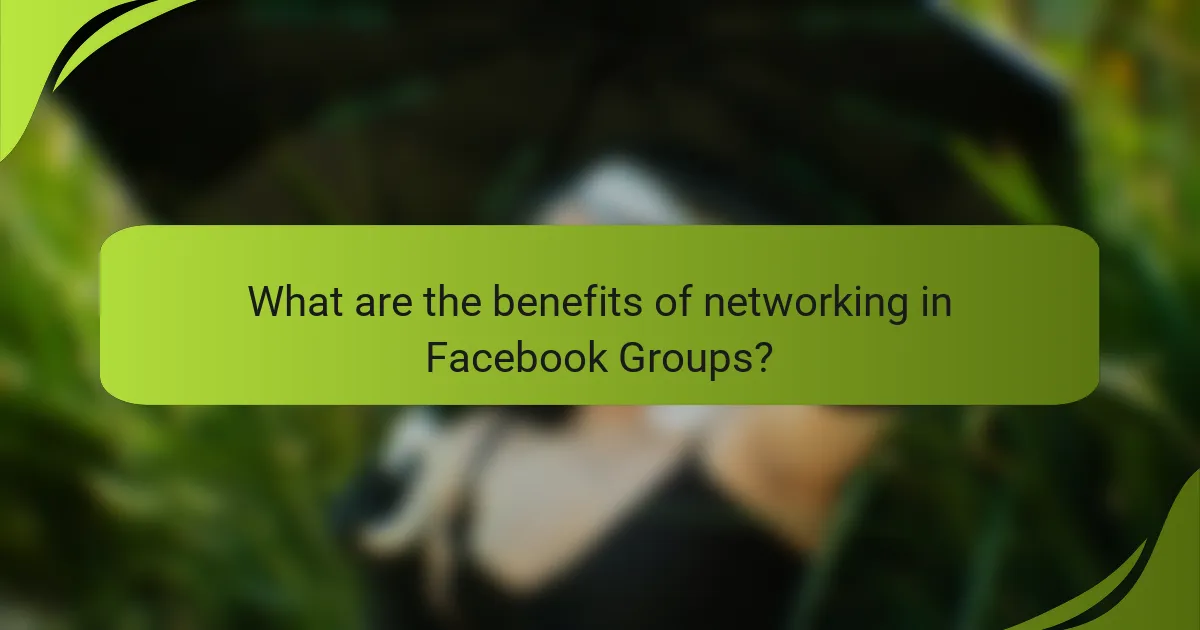
What are the benefits of networking in Facebook Groups?
Networking in Facebook Groups offers valuable opportunities for personal and professional growth, enabling members to connect with like-minded individuals and access resources. By engaging in these communities, users can enhance their knowledge, find collaboration opportunities, and share experiences that can lead to mutual benefits.
Access to industry professionals
Facebook Groups often attract industry professionals who share their insights and expertise. Members can engage in discussions, ask questions, and receive guidance from experienced individuals, which can be invaluable for career development. For example, a marketing professional might gain tips from a seasoned expert on effective campaign strategies.
To maximize this benefit, actively participate in conversations and reach out to professionals for advice. Avoid being overly promotional; instead, focus on building genuine relationships that can lead to mentorship or collaboration.
Opportunities for partnerships
Networking in Facebook Groups can lead to potential partnerships that benefit all parties involved. Members can find collaborators for projects, joint ventures, or even business opportunities that align with their goals. For instance, a graphic designer might connect with a content creator to develop a marketing campaign together.
When seeking partnerships, clearly communicate your goals and what you can offer. Be open to exploring different types of collaborations, as the right partnership can significantly enhance your reach and effectiveness.
Sharing knowledge and experiences
Facebook Groups provide a platform for members to share their knowledge and personal experiences, fostering a culture of learning. This exchange can include advice on best practices, lessons learned from failures, or tips on navigating industry challenges. For example, a small business owner might share their experience with a new marketing tool, helping others avoid pitfalls.
To contribute effectively, be concise and relevant in your posts. Encourage others to share their insights as well, creating a supportive environment where everyone benefits from the collective knowledge of the group.
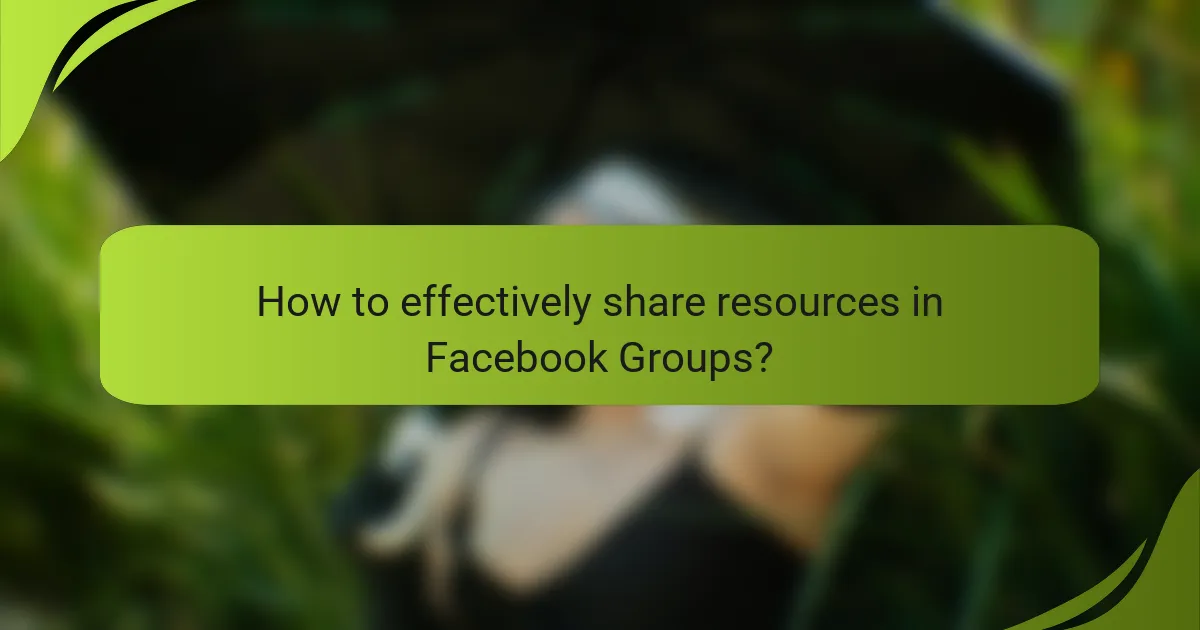
How to effectively share resources in Facebook Groups?
To effectively share resources in Facebook Groups, focus on posting relevant and valuable content that meets the needs of the community. Utilize features like pinned posts and resource libraries to enhance visibility and accessibility of shared materials.
Posting relevant content
When posting in Facebook Groups, ensure that the content is directly related to the group’s purpose and interests. Share articles, tools, or tips that can genuinely assist members. For instance, if the group focuses on small business support, consider sharing financial planning tools or marketing strategies.
Engage with the community by asking for feedback or suggestions on the resources you share. This interaction not only fosters a supportive environment but also helps you understand what members find most useful.
Utilizing pinned posts
Pinned posts are a valuable tool for highlighting important resources within a Facebook Group. Use this feature to keep essential information, such as guidelines or key resources, easily accessible at the top of the group feed. This ensures that new and existing members can quickly find what they need.
Regularly update pinned posts to reflect the most current and relevant resources. Consider rotating the content based on seasonal needs or community feedback to maintain engagement and relevance.
Creating resource libraries
A resource library is an organized collection of valuable materials that members can access anytime. To create one, consider using a shared document or a dedicated post that lists links to articles, videos, and tools categorized by topic. This allows members to easily navigate and find specific resources.
Encourage group members to contribute to the library by sharing their own resources. This collaborative approach not only enriches the library but also strengthens community bonds as members feel more invested in the group’s success.
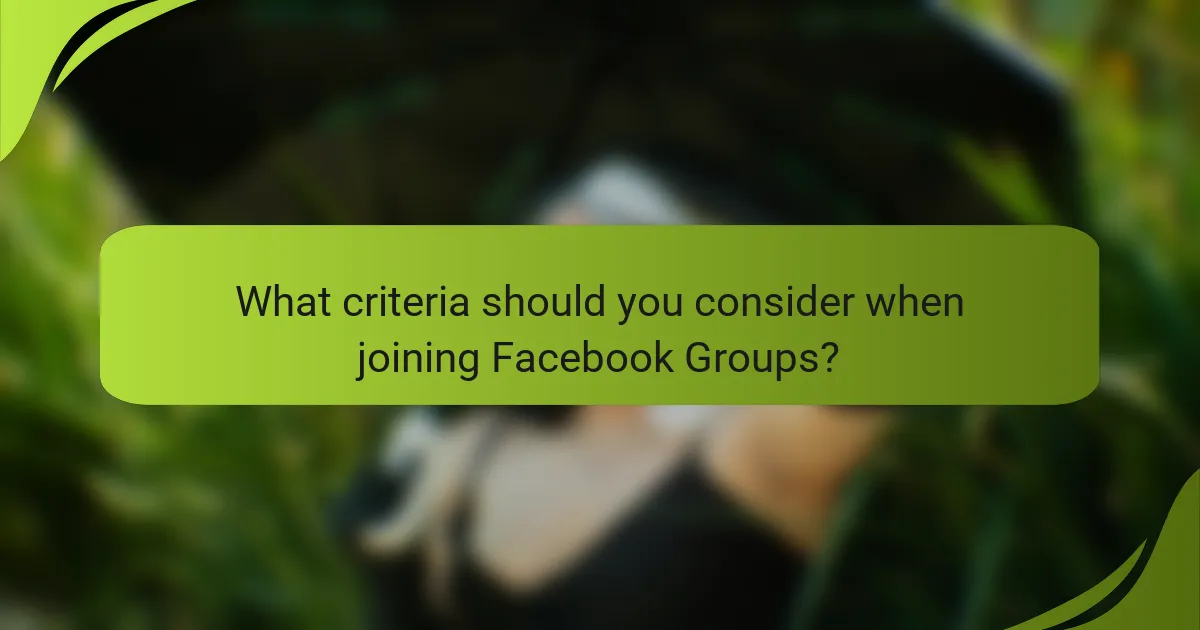
What criteria should you consider when joining Facebook Groups?
When joining Facebook Groups, consider factors such as group size, activity level, relevance to your interests, and the moderation policies in place. These criteria will help ensure that you engage with a community that meets your needs and expectations.
Group size and activity level
The size of a Facebook Group can significantly impact your experience. Smaller groups may offer more personalized interactions, while larger groups often provide a broader range of perspectives and resources. Aim for groups with active discussions, ideally with daily posts or comments to keep the conversation lively.
Check the group’s engagement metrics, such as the number of active members and the frequency of posts. A good rule of thumb is to look for groups with at least a few hundred members and regular activity to ensure a vibrant community.
Relevance to your interests
Joining groups that align closely with your interests is crucial for meaningful engagement. Whether you are looking for support, networking, or resource sharing, ensure the group’s focus matches your goals. For example, if you are a freelance graphic designer, seek out groups specifically for design professionals rather than general freelancer groups.
To assess relevance, review the group’s description and recent posts. Look for keywords that resonate with your interests and check if the discussions are aligned with your professional or personal goals.
Moderation and rules
Understanding a group’s moderation policies and rules is essential for a positive experience. Groups with clear guidelines help maintain a respectful and constructive environment. Look for groups that have active moderators who enforce rules regarding spam, harassment, and off-topic discussions.
Before joining, read the group’s rules and recent announcements to gauge the moderation style. Groups with strict rules may provide a more focused experience, while those with lenient policies might allow for broader discussions but could lead to off-topic content.

How to create a successful Facebook Group?
Creating a successful Facebook Group involves defining a clear purpose, establishing guidelines, and engaging members consistently. These elements help foster a supportive community where members can network and share resources effectively.
Defining group purpose
Clearly defining the purpose of your Facebook Group is essential for attracting the right members. Consider what topics or interests the group will focus on and how it will benefit its members. For example, a group could center around local business networking or support for specific hobbies.
Make the group’s purpose visible in the description and pinned posts, ensuring that potential members understand what to expect. This clarity helps set the tone and encourages engagement from those who share similar interests.
Establishing clear guidelines
Establishing clear guidelines is crucial for maintaining a positive environment within your group. Outline acceptable behavior, posting rules, and consequences for violations. For instance, you might prohibit spam and personal promotions to keep discussions relevant and valuable.
Consider creating a pinned post that details these guidelines, making it easy for members to refer back to them. Regularly remind members of the rules to ensure compliance and address any issues promptly to maintain group harmony.
Engaging with members regularly
Regular engagement with members is vital for a thriving Facebook Group. Post updates, ask questions, and encourage discussions to keep the community active. For example, you could host weekly Q&A sessions or themed discussions to spark interaction.
Additionally, respond to comments and messages promptly to show that you value member contributions. This responsiveness fosters a sense of community and encourages members to participate more actively, enhancing the overall group experience.
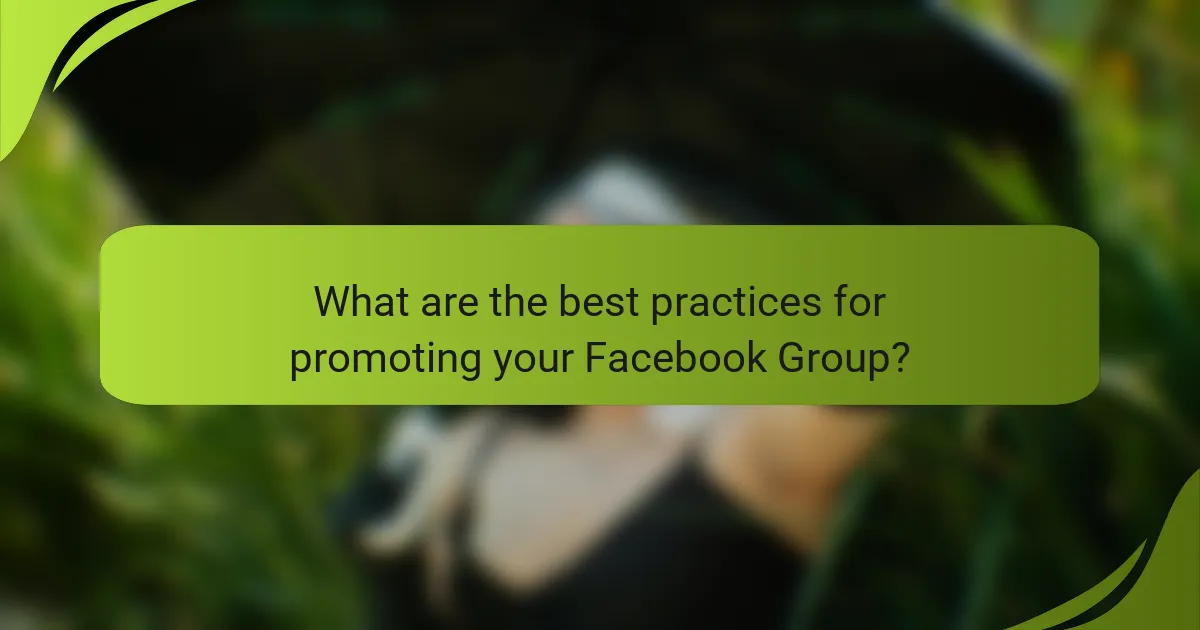
What are the best practices for promoting your Facebook Group?
To effectively promote your Facebook Group, focus on creating valuable content, engaging with members, and leveraging other platforms. Consistent promotion and interaction can significantly boost visibility and member participation.
Utilize Engaging Content
Creating engaging content is crucial for attracting and retaining members in your Facebook Group. Share informative posts, videos, and polls that encourage interaction. Aim for a mix of educational and entertaining content to keep the group lively and appealing.
Consider using visuals, such as infographics or images, to enhance your posts. Posts that include images tend to receive higher engagement rates, making them more likely to be shared and seen by potential new members.
Leverage Other Social Media Platforms
Promoting your Facebook Group on other social media platforms can help reach a broader audience. Share links to your group on platforms like Instagram, Twitter, or LinkedIn, and encourage your followers to join. Tailor your message to fit the audience of each platform for better results.
Additionally, consider collaborating with influencers or other groups in your niche. This can introduce your group to their followers, potentially increasing your membership base significantly.
Engage with Your Members
Active engagement with your members fosters a sense of community and encourages participation. Respond to comments, ask for feedback, and create discussions that invite members to share their thoughts. Regularly acknowledging members’ contributions can also enhance their loyalty to the group.
Host live Q&A sessions or virtual events to further engage your audience. These interactive experiences can help solidify relationships and make members feel valued, increasing the likelihood of them inviting others to join.
Promote Your Group Offline
Don’t overlook offline promotion as a way to grow your Facebook Group. Share flyers or business cards with your group’s information at local events, workshops, or community centers. This can attract individuals who may not be active online but are interested in your group’s focus.
Networking in person can lead to meaningful connections, and personal recommendations often carry more weight than online promotions. Encourage existing members to spread the word in their communities as well.
